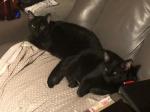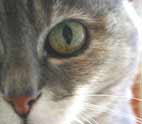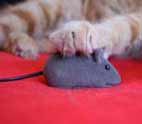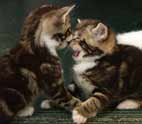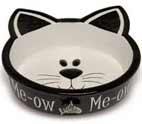Cat Eating Disorders
or Why Wont My Cat Eat?
When talking about cat eating disorders, most of us are talking about those times when our cat just simply refuses to eat its food for no apparent reason.
However with everything a cat does, there is always a reason, unfortunately us mere Humans are just not tuned into their sensibilities and so find the whole subject of cat eating problems a real puzzle.
I will try to highlight the main causes of cat eating disorders and how we can help our feline friends overcome these problems.
It is important to remember that every cats situation is different and so if you find your cat having some eating problems,
I always suggest that you try to put yourself into their position and see if you can see things their way, rather than becoming frustrated and worried.
Why Won't My Cat Eat Their Food?
So youve put down your cats usual plate of food, the one he usually eats with relish. He looks at it, he smells it, he looks up at you and then just casually walks away.
Your first reaction is UH, now why is he not eating his food this time?
The first two things to consider and to eliminate from your investigation are:
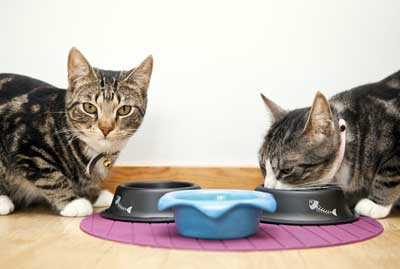
- Is the food bad? Always check the sell by dates on the packaging. I recently bought some food from the supermarket and when I got it home noticed that it was six months out of date.Next check to see if the can or box is damaged which may have caused the food inside to become stale or tainted. Smell the food to see if it is different from normal and look at it to make sure there is no mould etc.
- Is the cat Ill? A cat that is not feeling its usual self may not have much of an appetite. So check to see if your cat is displaying any other unusual behaviour. If you suspect illness and your cat continues not to eat for several meals, then a trip to the vets is called for.
- Is the food too cold? What, too cold? yes this can really stop your cat from eating their favourite food. Cats like strong smelling food and cold food often loses it's smell. Dry warming it slightly, this will help increase the smell.
Natural Eating Habits of The Cat
In todays busy world, a lot of cat owners decide to feed the cat by providing a large bowl of food to last them the whole day while they are out etc. Luckily most cats will self regulate themselves and eat a bit at a time. Why? In the wild the cats natural prey are normally small rodents and birds.
And when you consider how much meat is on these animals then it becomes clear that cats are used to eating small amounts at a time, digesting this and then hunting again.
So when you leave a large bowl of food down and your cat eats a little and then leaves the rest, perhaps for later, all they are doing is mimicking their natural behaviour.
So if your cat doesnt eat the food put down for him straight away, it could simply be that they are not yet ready to eat again, hardly a cat eating disorder, but non the less worth considering as a cause.
Other Reasons Why Your Cat Wont Eat Its Food
Not A Cat Eating Disorder But A Natural Eating Behaviour
A little known fact about cats is that they have an inbred mechanism to change their diet from time to time .
Birds also have this same mechanism. It is basically a survival technique, when the chips are down and usual sources of food disappear the animal will be able to adapt to new food easily.
So a cat has a natural desire to want different food from time to time. This does not mean they go off their original food entirely but they just require a change for a while.
Yes I know this can be a nuisance, but perhaps keep a couple of cans of different food in the house (they normally have along shelf life), so that on those days your cat just flatly refuses his normal food, you will be prepared.
A strange thing to note here is that a cat fed from kitten hood on just one type of food its whole life will lose this mechanism and in fact will develop a condition known as neophobia.
Which is a fear of anything new. So new tastes and smells will be threatening to them. So it is really in the interests of both the owner and the cat that these whims of change are succumbed to.
A Cat Eating Disorder Known As Pica
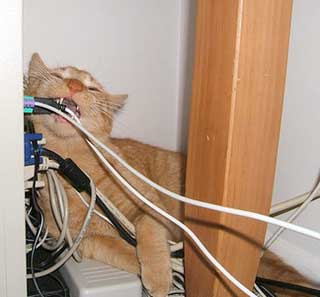
Pica is the name given to a group cat eating disorders where cats become almost addicted to eating non-food substances. Reported cases of Pica have ranged from cats eating rubber, fabric, electrical cables and wool.
The cause is not yet known and the main way of treating these cases is to make the substance they are trying to eat very unpleasant by adding a strong smelling substance like lemon or eucalyptus to it.
Indoor cats more often display these strange cat eating disorders and so it is thought that it might be that the cats are under stimulated or have remained mentally as kittens because they have not been able to develop all their natural hunting skills etc.
n these cases providing more things for the cat to do may help to distract them from this strange and also dangerous occupation. Cat climbing frames and trees and various toys and dens may help to make their environment more appealing to their hide and seek temperament.
Top of this Cat Eating Disorders Page

